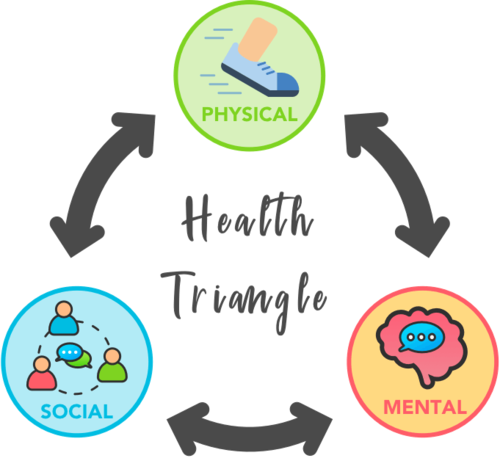The concept of the Health Triangle emphasises the interconnections of social, physical, and mental well-being, forming the foundation for overall health.
Achieving a harmonious balance among these three aspects is essential for leading a fulfilling and healthy life.
In this article, we will delve into each component of the Health Triangle, exploring their significance and offering insights on how to optimise each for improved well-being.

Table of Contents
ToggleSocial Health:
Social health pertains to one’s ability to build and maintain meaningful relationships, communicate effectively, and participate in a supportive community.
Strong social connections contribute to emotional resilience and can positively impact both mental and physical health. Engaging in social activities, fostering connections with friends and family, and cultivating a sense of belonging are crucial elements of social health.
Tips for Improving Social Health:
- Cultivate positive relationships: Surround yourself with supportive individuals who uplift and inspire you.
- Foster effective communication: Develop strong communication skills to express your thoughts and feelings clearly.
- Participate in community activities: Join clubs, volunteer, or engage in group activities to build a sense of community.
Physical Health:
Physical health encompasses the state of the body and its ability to perform daily activities without undue fatigue or physical stress. Proper nutrition, regular exercise, and sufficient rest are key components of maintaining physical well-being. A healthy body contributes to increased energy levels, improved immune function, and a reduced risk of chronic diseases.
Tips for Improving Physical Health:
- Adopt a balanced diet: Consume a variety of nutritious foods to ensure your body receives essential vitamins and minerals.
- Engage in regular exercise: Incorporate both cardiovascular and strength-training exercises into your routine to promote overall fitness.
- Prioritize sleep: Aim for 7-9 hours of quality sleep each night to support physical and mental recovery.
Mental Health:
Mental health encompasses emotional and psychological well-being, involving the ability to cope with stress, build resilience, and maintain a positive mindset. It is equally important as physical health for overall wellness. Practices such as mindfulness, stress management, and seeking professional help when needed contribute to optimal mental health.
Tips for Improving Mental Health:
- Practice mindfulness: Incorporate meditation, deep breathing, or other mindfulness techniques into your daily routine.
- Manage stress effectively: Identify stressors and develop coping strategies, such as time management or seeking social support.
- Seek professional help: If you’re facing challenges with mental health, don’t hesitate to consult with a mental health professional for guidance and support.
Conclusion:
The Health Triangle serves as a holistic framework for understanding and enhancing overall well-being. By consciously nurturing social, physical, and mental health, individuals can strive towards a balanced and fulfilling life. Remember that these components are interconnected, and investing in one aspect positively influences the others, creating a positive feedback loop that contributes to a healthier and happier existence.
Frequently Asked Questions (FAQ)
1. What is the Health Triangle?
- The Health Triangle is a concept that emphasizes the interconnectedness of social, physical, and mental health. It suggests that a balanced and holistic approach to well-being involves nurturing these three aspects of health.
2. Why is social health important in the Health Triangle?
- Social health is crucial because it involves building and maintaining positive relationships, fostering a sense of belonging, and participating in supportive communities. Strong social connections contribute to emotional well-being and can positively impact both mental and physical health.
3. How can I improve my social health?
- You can improve your social health by cultivating positive relationships, fostering effective communication skills, and participating in community activities. Surrounding yourself with supportive individuals and engaging in social interactions contribute to a healthier social life.
4. What does physical health encompass in the Health Triangle?
- Physical health involves the state of the body and its ability to perform daily activities without undue fatigue or stress. It includes aspects such as proper nutrition, regular exercise, and sufficient rest to maintain optimal well-being.
5. How can I enhance my physical health?
- To enhance physical health, adopt a balanced diet, engage in regular exercise that includes both cardiovascular and strength training, and prioritize sufficient sleep. These practices contribute to increased energy levels, improved immune function, and reduced risks of chronic diseases.
6. What is the significance of mental health in the Health Triangle?
- Mental health is crucial for emotional and psychological well-being. It involves the ability to cope with stress, build resilience, and maintain a positive mindset. Mental health is equally important as physical health for overall wellness.
7. How can I improve my mental health?
- To improve mental health, practice mindfulness techniques, manage stress effectively by identifying stressors and developing coping strategies, and seek professional help if needed. Prioritizing mental well-being contributes to overall health and happiness.
8. Are the components of the Health Triangle interconnected?
- Yes, the components of the Health Triangle are interconnected. Positive changes in one aspect, such as improving social health, can positively influence physical and mental health, creating a holistic and positive feedback loop.
9. Can neglecting one aspect of the Health Triangle affect overall well-being?
- Yes, neglecting one aspect of the Health Triangle can have a domino effect on overall well-being. For example, neglecting social connections may impact mental health, which can, in turn, affect physical health. Striving for a balance in all three components is essential for optimal well-being.
10. How can I implement the principles of the Health Triangle in my daily life?
- Implement the principles of the Health Triangle by consciously making choices that support social, physical, and mental well-being. This includes building positive relationships, adopting a healthy lifestyle, practicing stress management, and seeking professional help when needed. Regular self-reflection and adjustments in daily habits can contribute to a more balanced and fulfilling life.
